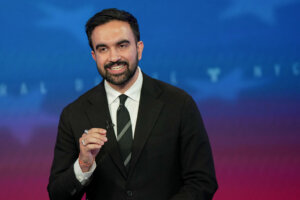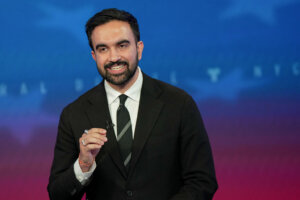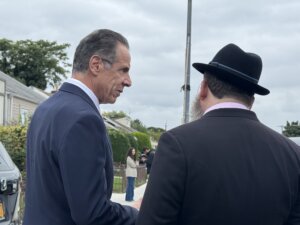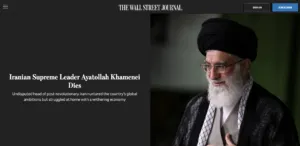Uncategorized
At debate, Cuomo and Mamdani clash over Israel in pitch to Jewish voters

Zohran Mamdani and Andrew Cuomo clashed sharply over the Israeli-Palestinian conflict on Thursday night, in the first televised debate for New York City mayor, their first major showdown since the young democratic socialist stunned the former governor in the Democratic primary. And a Yiddish slang term even made its way into the heated back-and-forth.
Days after the implementation of a ceasefire in Gaza, many of the two candidates’ early exchanges centered on Mamdani’s critiques of Israel, positions that have roiled New York’s Jewish community — the largest outside of Israel. Beginning with the primary, Mamdani has faced scrutiny for refusing to outright condemn the slogan “globalize the intifada,” calling the Gaza war a “genocide,” and pledging to arrest Israeli Prime Minister Benjamin Netanyahu if he visited the city.
Commenting Thursday on the recent ceasefire between Israel and Hamas, Mamdani clarified earlier remarks he made about having no opinion on whether or not Hamas should disarm as part of a post-war deal.
“Of course, I believe that they should lay down their arms,” Mamdani said. But he declined to welcome or credit President Donald Trump’s administration for brokering the ceasefire that ended the fighting and secured the release of the remaining living hostages.
Mamdani also appeared to draw a moral parallel between Hamas’ disarmament and Israel halting strikes on the enclave. “Calling for a ceasefire means ceasing fire,” he said. “That means all parties have to cease fire and put down their weapons.” A real peace, he continued, must address “the conditions that preceded this, conditions like occupation, the siege and apartheid.”
“That means ‘from the river to the sea,’” Cuomo countered, in an effort to suggest that Mamdani’s rhetoric mirrored the popular pro-Palestinian protest slogan that many Jews view as a call for the destruction of Israel. Cuomo also wrongly claimed that Mamdani refused to condemn Hamas. “I have denounced Hamas again and again,” Mamdani said. “It will never be enough for Andrew Cuomo, because what he is willing to say, even though not on this stage, is to call me, the first Muslim on the precipice of leading this city, a terrorist sympathizer.”
Curtis Sliwa, the Republican nominee, who took center stage without his signature red beret, was largely ignored by the two leading contenders. That didn’t stop Sliwa, who has his own history of controversial remarks about Jews, from inserting himself into the debate.
“Jews don’t trust that you are going to be there for them when they are victims of antisemitic attacks,” the Republican candidate told Mamdani.
Mamdani’s Jewish appeal

Since his surprise victory in June, Mamdani has redoubled his outreach efforts in the Jewish community, including by celebrating Sukkot with Orthodox leaders.
Still, Mamdani faces hurdles with the Jewish electorate. A recent Quinnipiac poll showed Mamdani trailing Cuomo by 31 points among Jewish voters, while maintaining a double-digit lead citywide. Just 22% of Jewish voters view Mamdani favorably, while 67% hold an unfavorable opinion.
The survey found that a plurality of likely voters share Mamdani’s views on the Israel-Hamas conflict.
At the debate, Mamdani repeated past statements about his commitment to protect Jewish New Yorkers. He also reaffirmed his recognition of Israel — though not as a Jewish state. That seemed to resonate with more liberal and progressive Jews. Mamdani has been endorsed by local Jewish elected officials, including Brad Lander, the city comptroller and Rep. Jerry Nadler, co-chair of the congressional Jewish Caucus. Addressing members of Congregation Beth Elohim in Brooklyn last week, Mamdani said, “I’m going to have people in my administration who are Zionists, whether liberal Zionists, or wherever they may be on that spectrum.”
Ahead of the debate, Rabbi Ammiel Hirsch of the Stephen Wise Free Synagogue said in a video statement that Mamdani’s long-standing rejection of Zionism is an example of “rigid ideological commitments that delegitimize the Jewish community and encourage and exacerbate hostility towards Judaism and Jews.”
Cuomo’s Yiddish

During Thursday night’s debate, Cuomo also deployed a Yiddish slang term when debating which of the candidates would most effectively stand up to President Donald Trump.
“He can’t stand up to Donald Trump, who’d knock him right on his tuches,” Cuomo said, wagging his finger at Mamdani and using the Yiddish term for behind.
Cuomo once described himself as the “Shabbos goy” of New York’s Jewish community — the same term his father, former Governor Mario Cuomo, once used, referring to a non-Jew who performs certain tasks for Jews on the Sabbath.
The former governor, who is backed by some Orthodox voting blocs, suggested that many of his Jewish supporters view Mamdani as antisemitic. “It’s not about Trump or Republicans,” he told his chief rival. “It’s about you.”
The post At debate, Cuomo and Mamdani clash over Israel in pitch to Jewish voters appeared first on The Forward.
Uncategorized
‘A Bushy Beard and Easy Smile’: Western Media’s Grotesque Framing of Ayatollah Ali Khamenei’s Death

A woman holds a poster with the picture of Iran’s Supreme Leader Ayatollah Ali Khamenei as people gather after Khamenei was killed in Israeli and U.S. strikes on Saturday, in Tehran, Iran, March 1, 2026. Majid Asgaripour/WANA (West Asia News Agency) via REUTERS
Ayatollah Ali Khamenei was only the second Supreme Leader of the Islamic Republic of Iran. He assumed power in 1989 following the death of Ayatollah Ruhollah Khomeini, and ruled for decades as the ultimate authority over a regime defined by repression, regional destabilization, and violent ideological extremism.
His tenure was marked by:
- The systematic crushing of political dissent
- The imprisonment, torture, and execution of dissidents
- The violent suppression of nationwide protest movements
- The arming and financing of proxy militias across the Middle East
- The institutionalization of chants of “Death to America” and repeated threats to destroy Israel
Under his leadership, Iran’s security forces opened fire on protesters during successive waves of unrest in 2009, 2019, and during the nationwide demonstrations that followed the death of Mahsa Amini in 2022. In January of this year, fresh nationwide protests were again met with force.
Independent analysts estimate that at least 30,000 people were killed in the crackdown, a figure the regime has never credibly refuted. Across these cycles of repression, human rights organizations have documented thousands more deaths and tens of thousands detained.
Yet when Iranian state media confirmed Khamenei’s death nearly 24 hours after US and Israeli airstrikes struck his compound in Tehran, segments of Western media coverage adopted a tone that bordered on reverential.
The most notable example appeared in The Washington Post, which described Khamenei as known for his “bushy white beard and easy smile,” noting that he cut a “more avuncular figure in public” than his predecessor. The obituary highlighted his fondness for Persian poetry and classic Western novels, including Victor Hugo’s Les Misérables.
The New York Times summarized him as a “hardline cleric” who had made “Iran a regional power” while maintaining hostility toward the United States and Israel.
Sky News labeled him the “arch foe” of President Donald Trump, framing the moment as a personal rivalry.
The Wall Street Journal observed that he “nurtured the country’s global ambitions but struggled at home with a withering economy.” Reuters referred to his “fiery ambitions” toward Israel and the United States. The BBC aired images of mourners drawn from regime-controlled broadcasts with little scrutiny of their staging.
Across outlets, the pattern was consistent.
The man who presided over decades of repression was reframed through aesthetic detail and political positioning. His beard. His smile. His literary tastes. His “ambitions.”
His victims were secondary.

This is not about demanding polemics from obituary writers. It is about proportion.
When authoritarian rulers die, the moral weight of their record should not be softened by lifestyle detail or neutralized by euphemism. Calling a regime ideologue a “hardliner” obscures the reality that he headed a theocratic state apparatus that jailed journalists, executed political prisoners, funded Hezbollah and Hamas, and ordered violent crackdowns against his own people.
Headlines shape historical memory. The first paragraph matters more than the 12th. In death, reputations are distilled and authoritarian rulers should not be granted the luxury of dilution.
So while newspapers fawned over what they chose to highlight, from his wry smile to his love of literature and carefully cultivated image, the rest of us should remember him for what he was: a brutal dictator who deserved the fiery end he met.
The author is a contributor to HonestReporting, a Jerusalem-based media watchdog with a focus on antisemitism and anti-Israel bias — where a version of this article first appeared.
Uncategorized
Hezbollah Opens a Second Front and Israel Gets the Blame

Smoke billows after an Israeli strike on Beirut’s southern suburbs, following an escalation between Hezbollah and Israel amid the US-Israeli conflict with Iran, Lebanon, March 2, 2026. Photo: REUTERS/Mohamed Azakir
While the question of whether or when war between Israel and Iran would break out, so too was the question of whether Iran’s proxy Hezbollah would join the fight and act as a layer of protection for the Iranian regime.
Since Hezbollah and Israel agreed to a ceasefire in November 2024, the terrorist organization has worked to rebuild its infrastructure and regain its status as Iran’s strongest terrorist proxy in the Middle East. In doing so, it has consistently and relentlessly broken the ceasefire, committing at least 1,925 violations up to near the end of 2025.
The threat posed by Hezbollah has been greatly diminished after the year-long war, as Israel destroyed much of its infrastructure and forces, thus stripping the terrorist organization of its ability to conduct large-scale operations it was once capable of. But the danger persists.
Hezbollah still maintains considerable political influence inside Lebanon, which results in direct leverage over policies and daily life in Lebanese society. It has effectively been recognized as a state within a state, threatening the very existence of the Lebanese state itself. For this reason, Lebanon has failed to fully disarm Hezbollah, despite the Lebanese Army’s claim that the first stage in the process was completed.
Since its inception, Iran has funded Hezbollah, making the organization the most prominent proxy in Iran’s regional power structure. In fact, Hassan Nasrallah, the late leader who was killed in an Israeli airstrike in September 2024, had referred to himself as a “soldier” in the Iranian regime’s army. Thus, Israeli and US intentions to collapse the Iranian regime are a direct threat to the very foundation on which Hezbollah is built.
Despite repeated warnings by Israel not to join the fight (as well as the pleas from Lebanon’s fragile government), in the early hours of Monday morning, Hezbollah fired rockets towards Israel. This marked the first time since the full-scale war with Hezbollah that the terrorist organization fired rockets into Israeli territory.
Similar to Hezbollah’s reaction of launching what it called a “solidarity” front for Hamas following the attacks of October 7, 2023, Hezbollah claimed that the firing of rockets into Israel was “revenge for the blood of the Supreme Leader of the Muslims, Ali Khamenei,” who was killed in an Israeli airstrike on the first day of the war.
Despite even Hezbollah acknowledging it was the party to fire first, the narrative in the media reversed the order of events, referring to Israel’s “attack” on Lebanon as the cause for the widening conflict.
Yet the timeline of events remains abundantly clear: Hezbollah opened a second front in the war — breaking the ceasefire to do so — by firing at least six rockets and two drones.
Immediately after Hezbollah joined the war by attacking Israel, the IDF responded with a series of strikes on Hezbollah targets across Lebanon, including targeting senior leadership. While Israel has responded to previous ceasefire violations, the firing of rockets into Israeli territory crossed a clearly defined red line set by the IDF. As a result, Israel initiated direct kinetic action aimed at further degrading Hezbollah’s operational capabilities and deterring escalation.
Shifting the attention away from Hezbollah’s initiating actions and instead framing Israel’s response as the catalyst for escalation obscures the reality of the war Israel is now fighting on two fronts.
Although the dangers posed by the Iranian regime have been the primary target of the war, Israel’s commitment to deterring and removing the threat of any terrorist actor remains steadfast. When media coverage downplays Hezbollah’s responsibility, Israel’s defensive measures risk being perceived as unprovoked aggression. This reframing not only distorts the sequence of events but also seeks to undermine Israel’s ability to maintain deterrence.
In this war, accurate reporting of terrorist organizations and the sequence of events is not optional — it is essential to understanding the realities shaping the conflict and the decisions that follow.
The author is a contributor to HonestReporting, a Jerusalem-based media watchdog with a focus on antisemitism and anti-Israel bias — where a version of this article first appeared.
Uncategorized
In Gaza, Palestinians and Hamas Now Face a Moment of Choosing
With Iran’s Supreme Leader Ali Khamenei now dead, all eyes are naturally on what comes next for the Iranian people, as the Iranian regime veers between desperation and collapse.
The war in Iran is also stoking unease among the Islamic Republic’s proxies, as terror groups like Hamas figure out how to proceed without Iranian support.
Hamas still refuses to disarm — but its situation is growing more perilous.
Prior to Khamenei’s killing, Israel had already struck an unprecedented blow to Hamas’ military infrastructure. Now stripped of its sponsor, Hamas’s weakening posture should leave Palestinians questioning if Hamas really has their best interests at heart.
The strategic and economic opportunities for building a healthy society for its citizens have never been greater.
Less than two weeks before the US military and Israel Defense Forces (IDF) began striking Iran, US President Donald Trump convened the inaugural meeting of the Board of Peace, as member states from nearly 48 nations gathered to discuss the future of Gaza.
Chaired by President Trump, the newly established international body is tasked with overseeing Gaza’s reconstruction and transitional governance.
Trump announced at the summit that the United States would donate $10 billion to the Board, with other countries participating in the rehabilitation of the Gaza Strip contributing an additional $7 billion combined.
In an interview on Fox News’s My View with Lara Trump, Middle East Envoy Steve Witkoff reaffirmed the government’s commitment to “jump-starting” construction in Gaza and plans for a “renaissance” in the seaside area.
After launching the deadliest attack against Jews since the Holocaust, members of the international community are still willing to give Gazans a chance to forge a future rooted in prosperity and dignity.
By dispensing with failed frameworks and outdated Oslo-esque accords, the current US administration is not only creating the conditions for a freer Iran, but it is also unshackling Palestinians from Hamas rule and creating economic enticements to liberate Gazans from their terrorist trappings.
The responsibility now rests with Palestinians to embark on an earnest campaign of deradicalization and abandon their armed struggle against Israel.
It’s worth noting that, to date, much of the history of the region has been driven by an embrace of radicalism and violence.
Following Israel’s 2005 disengagement from Gaza and the eviction of 9,000 Israelis from their homes, billions of dollars in foreign financing flowed from international entities to the Gaza Strip.
The money meant to bolster the lives of Gazans was instead used to foment terror against Israelis.
The latest poll released by People’s Company for Polls and Survey Research (PCPSR) is similarly discouraging and illustrates that “support for Hamas’s decision to launch the [Oct. 7] offensive, while declining from its peak, remains a majority at more than 50 percent, with recent gains in Gaza and sustained high support in the West Bank.”
The goodwill shown to Palestinians by Israelis living in the Gaza envelope — which included numerous peace initiatives and work opportunities — was repaid in blood on October 7, as familiarity and friendship were used as fuel to achieve maniacal aims.
As Palestinians watch what is happening to Iran — a state that trafficked exclusively in terrorism — the Palestinians are now seeing they have their own choice — to choose peace over terrorism, encouraged by economic incentives by the US and the international community.
What happens to Palestinians in Gaza going forward largely depends on their motivation to confront and eliminate their fixation on eradicating Israel, and for their leaders to reorient their energies around building better lives for their citizens.
The Trump administration’s refreshing and untested approach to accelerate Gaza’s recovery is not packaged in empty two-state platitudes but rather wrapped in historic strategic changes and tangible economic benefits to Palestinian society.
Palestinians in Gaza now have the daunting duty of proving their readiness for reform.
For regional stability to be achieved, let’s hope that Palestinians in Gaza renounce their prior path of demonization and terror, and are indeed ready for rational governance that will ultimately yield long-term success for their people.
Irit Tratt is a writer residing in New York. Follow her on X @Irit_Tratt



